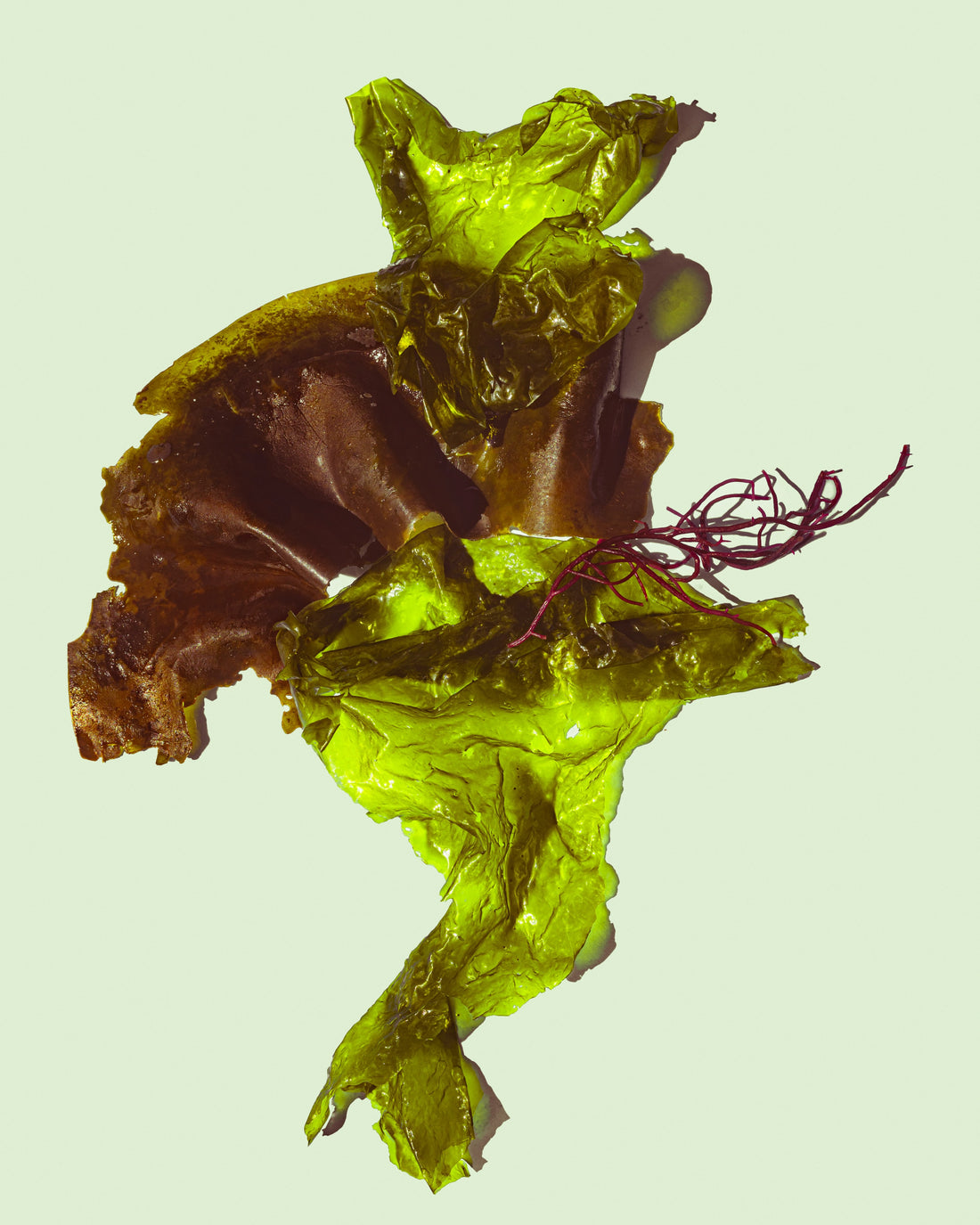Plant-based diets are on the rise, and the form of omega-3 found in seeds, nuts, and vegetables (ALA) is not well utilized by the body. Could seaweed be an option?
Let's learn more about what omega-3 is, what seaweed actually is, and the science behind it all. Let's dive in!
What Is Omega-3?

Before we learn about sources of omega-3, let's first break down what omega-3 is and why it is critical to include in your diet.
Think back to what you know about vitamins: they are compounds that your body absolutely must have in order to function properly, but your body can't make them itself — you have to get them from the foods you eat, or from supplements.
The same is true of omega-3 fats! They are required for your cells to operate, for your hormones to remained balanced, and for your skin and eyes to hold onto moisture.
Omega-3s fall into a category of healthy fats known as polyunsaturated fats. These complex, long-chain fatty acids are needed for many roles in the human body, most notably for heart, brain, joint, and eye health.
The three primary types of omega-3s are ALA (alpha-lineolenic acid), which functions more as a precursor to the two forms with the most research behind them: EPA (eicosapentaenoic acid) and DHA (docosahexaenoic acid).
While the human body can technically convert a small percentage of the ALA we consume into DHA and EPA, the conversion rate is low (scientists estimate it at most at 17%), and requires the rest of the diet to be pretty ideal… which, unfortunately for most of us, isn't the case. For this reason, especially for those of us who don't eat fish at least three times a week, taking a daily omega-3 supplement is the most reliable way to get these vital nutrients. Can seaweed play a role in meeting this need? Keep reading to find out!
Health Benefits
Omega-3s have a lot to contribute to your health. Omega-3 fats have been shown to help support the body's production of HDL cholesterol, the "good" cholesterol that helps sweep the bad kind, LDL, from the bloodstream. This helps keep your arteries clear and, thus, supports the health of your cardiovascular system.
Omega-3 is also great for supporting brain health. Omega-3s have been researched for their neuroprotective benefits — and this protective effect for the brain is part of what makes salmon a recommendation by integrative doctors for supporting long-term clear thinking. For those who avoid eating fish, another option might be necessary.
Omega-3 even plays an important role in the development of a fetus or infant. It’s an important fat that helps your baby grow, and it also helps mothers during pregnancy. This is why DHA is a prominent ingredient in prenatal supplements and baby formula.
If you want to support your eyesight, omega-3 can help you do that as well. Omega-3, as a lipid, plays a big role in maintaining the structure of the cell membranes throughout the body. This is especially true with the eyes. Getting enough omega-3 every day can support the health of your eyes in the long term.
Common Dietary Sources
Omega-3 is found in our diet, but you might not get very much of it, depending on your lifestyle. The most common source of omega-3 is fatty fish like salmon, sardines, or tuna, but what if you avoid fish? As we've discussed, whether it's out of concern for the ecosystem of the ocean, or microplastic contamination, or a desire to avoid eating all living things, many people are looking for options beyond fish.

Luckily, we don't have to search too far. Fish don't make omega-3 themselves — they get it from what they eat. We can go straight to the source, too — algae!
Seaweed is technically classified as a macroalgae: a large form of the tiny organisms we might imagine when we think of algae. Seaweed is common in many diets around the world, especially throughout Asia and Pacific Islands.
The forms of seaweed that you might find on a menu near you, such as nori (used to wrap sushi, or sold in snack packets of small salted sheets) are nourishing, but not very high in omega-3… in a study, 7 types of seaweed were examined and found to contain low concentrations of EPA and essentially no DHA.
If seaweed is a macroalgae, then could its cousin, microalgae, be a reliable source of sought-after omega-3? Yes!
A tiny green cousin of seaweed, nannochloropsis, shares many traits with the slippery, floating green stuff we see on the seashore. Nannochloropsis also floats in salty water, uses the sun to photosynthesize, and produces precious nutrition that humans need...omega-3! At last, we've found the seaweed and omega-3 connection.
It’s important to remember that supplements are incredibly helpful in bridging the gaps in our diets and helping us meet our nutrition goals when getting enough is difficult. But supplements are not meant to replace healthy eating. It is important to continue to have a balanced diet full of omega-3 to keep your levels where they should be.
What Are the Benefits of Omega-3 From Sea Plants?
Many people use fish oil supplements to boost their omega-3 intake, but there is a lot of evidence that would suggest that sea plants like certain species of algae are better sources of this important fatty acid.
Let’s go through some of the benefits of these plant-based supplements.
Better Absorption
The omega-3 from sea plants like algae absorbs into the body far better than other sources such as fish oil or krill oil. When compared to fish oil and krill oil, algae oil absorbs into the body almost twice as efficiently, so this omega-3 goes much further than the omega-3 from fish.

This is because the omega-3 in sea plants like nannochloropsis algae is the only omega-3 that is naturally bound to glycolipids and phospholipids. This results in spontaneous emulsions happening once the omega-3s enter your body. This means that the oily omega-3 mixes itself with the water in your digestive system, leading to much more precious omega-3 actually making it into your bloodstream and into your cells!
More Sustainable Farming
The farming practices to get omega-3 from seaweed’s tiny cousin, algae, are incredibly efficient, making them a fantastic source of omega-3. For starters, algae farms can be built on arid land, taking land that couldn't be used for any other purpose and turning it into an oasis of nutrient production.
In addition, algae farms are very nutritionally efficient no matter how you measure them. These farms produce more essential protein per acre and gallon than traditional farming practices.
Algae can grow in these farm beds with just saltwater (which is plentiful just beneath the desert landscape), sunshine (which pours down on this hot climate all year long), and a few key nutrients added to the mix, and 97% of the saltwater can be recycled for further use. No fresh water and no soil make for incredibly efficient farming, and it leaves valuable resources behind for other valuable farms and crops.
Protect the Environment
Getting your omega-3 from seaweed that you add to your plate, or algae that you take as a supplement, also helps to support and protect the environment. Getting these nutrients from fish and krill means fishing them out of their natural habitat. These are important organisms in their ecosystems, and taking them out can throw things out of balance.
This is especially true when it comes to krill. Krill are a vital part of the ocean’s ecosystem. When krill eat their food — microalgae at the ocean's surface which have absorbed carbon from the air — the carbon gets ingested by the krill, who then excrete it to the ocean floor. This is an important natural form of carbon sequestration!
Krill are a vital part of our fight against climate change. Algae farming leaves these important organisms where they belong so they can continue to do what they do best.
Suitable for Plant-Based Diets
Seaweed is also suitable for people with plant-based diets. It can be difficult for people who only eat plants to get valuable nutrients like omega-3, but seaweed can give you what you need no matter what your diet is.
Algae oil is gluten-free, animal-free, and dairy-free. No matter how you eat, this source of omega-3 can work for you.
Additional Omegas
Algae oil also contains additional omega acids beyond omega-3. It contains omega-6, omega-7, and omega-9, on top of the already present EPA, DHA, and other omega-3s. It’s an incredibly powerful source of healthy fats that can support your heart health.
Plant-Based Omega-3s

Seaweed and algae are incredibly valuable sources of nutrition, especially when it comes to omega-3. Omega-3 from sea plants has better absorption, is farmed more sustainably, is better for the environment, suitable for all diets, and has more nutrition to offer than just omega-3s.
Here at iwi life, our algae-based omega-3 supplements come from a micro-algae known as nannochloropsis. Try our supplements today and experience the power of plant-based nutrition from the sea.
Sources
Omega-3 Fatty Acids Fact Sheet for Consumers | National Institutes of Health
















